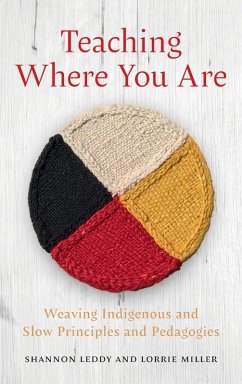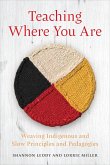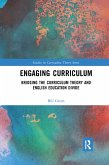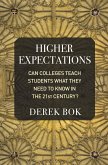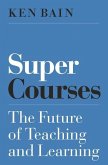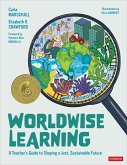Shannon Leddy, Lorrie Miller
Teaching Where You Are
Weaving Indigenous and Slow Principles and Pedagogies
Shannon Leddy, Lorrie Miller
Teaching Where You Are
Weaving Indigenous and Slow Principles and Pedagogies
- Gebundenes Buch
- Merkliste
- Auf die Merkliste
- Bewerten Bewerten
- Teilen
- Produkt teilen
- Produkterinnerung
- Produkterinnerung
Drawing on First Peoples Principles of Education, this book highlights the ways in which Indigenous learning and pedagogies parallel the western notion of Slow pedagogy.
Andere Kunden interessierten sich auch für
![Teaching Where You Are Teaching Where You Are]() Shannon LeddyTeaching Where You Are27,99 €
Shannon LeddyTeaching Where You Are27,99 €![Engaging Curriculum Engaging Curriculum]() Bill GreenEngaging Curriculum61,99 €
Bill GreenEngaging Curriculum61,99 €![Higher Expectations Higher Expectations]() Derek BokHigher Expectations20,99 €
Derek BokHigher Expectations20,99 €![Super Courses Super Courses]() Ken BainSuper Courses21,99 €
Ken BainSuper Courses21,99 €![Worldwise Learning Worldwise Learning]() Carla Marschall (Dresden International School in Germany Director)Worldwise Learning49,99 €
Carla Marschall (Dresden International School in Germany Director)Worldwise Learning49,99 €![Owning Your Project-Based Learning Owning Your Project-Based Learning]() Jacqueline PrestonOwning Your Project-Based Learning57,99 €
Jacqueline PrestonOwning Your Project-Based Learning57,99 €![Sound Curriculum Sound Curriculum]() Walter S. GershonSound Curriculum61,99 €
Walter S. GershonSound Curriculum61,99 €-
-
-
Drawing on First Peoples Principles of Education, this book highlights the ways in which Indigenous learning and pedagogies parallel the western notion of Slow pedagogy.
Hinweis: Dieser Artikel kann nur an eine deutsche Lieferadresse ausgeliefert werden.
Hinweis: Dieser Artikel kann nur an eine deutsche Lieferadresse ausgeliefert werden.
Produktdetails
- Produktdetails
- Verlag: University of Toronto Press
- Seitenzahl: 192
- Erscheinungstermin: 17. November 2023
- Englisch
- Abmessung: 229mm x 152mm x 16mm
- Gewicht: 468g
- ISBN-13: 9781487549947
- ISBN-10: 1487549946
- Artikelnr.: 69234864
- Herstellerkennzeichnung
- Libri GmbH
- Europaallee 1
- 36244 Bad Hersfeld
- gpsr@libri.de
- Verlag: University of Toronto Press
- Seitenzahl: 192
- Erscheinungstermin: 17. November 2023
- Englisch
- Abmessung: 229mm x 152mm x 16mm
- Gewicht: 468g
- ISBN-13: 9781487549947
- ISBN-10: 1487549946
- Artikelnr.: 69234864
- Herstellerkennzeichnung
- Libri GmbH
- Europaallee 1
- 36244 Bad Hersfeld
- gpsr@libri.de
Shannon Leddy is an associate professor of Art Education at the University of British Columbia.
List of Illustrations
Abbreviations
Foreword: Weaving and Reweaving Indigenous Education in New Ways through
the Timelessness of Transformative Thought, Teaching, and Learning xvii
Herman Michell
Preface
Acknowledgements
1. Tawâw
Bringing Indigenous Knowledge and Pedagogies into the Class
Indigenous Ways and Reconciliation
The Medicine Wheel Framework, Our Loom
Warp and Weft: Connecting Slow to Indigenous Ways
2. Building Decolonial Literacy for Indigenous Education
Historically Rooted Thought: We Are All Colonized People
It Is Not about the Lesson Plans
Ontologies
Identity
Place
Relationship
Weaving
Sourcing and Preparing Materials
3. Slow Ways and Indigenous Ways
Disconnecting from the Clock and Caring Deeply
Experiential
Land Conscious/Place Conscious
Deeply Relational
Internal Connection
Spinning
4. East - Spiritual - Respect
August on the Salish Sea: Tucked into a Bay
Dyeing the Yarn before the Weave
5. South - Emotional - Relevance
Why Emotion Matters
Decolonizing Is a Slow and Careful Business
Taking Trauma into Account
Developing Effective Practices
Circle Pedagogy
Winding the Wool
6. West - Physical - Reciprocity
The Unseen
The Visible, Physical, Material World
In the Classroom
Pedagogy that Nurtures
Relational Place-Conscious Pedagogy
Setting up the Loom
7. North - Intellectual - Responsibility
What Counts as Knowledge? How Much Knowledge Counts?
It Really Isn’t about the Lesson Plans
Adding an Indigenous Lens
Developing Effective Practices
Kendomang Zhagodenamonon Lodge
Button Blankets and Starblankets
Tiny Orange Sweater Project
Summing Up
Weaving and Finishing
8. Pimoteh (Walking)
References
Index
Abbreviations
Foreword: Weaving and Reweaving Indigenous Education in New Ways through
the Timelessness of Transformative Thought, Teaching, and Learning xvii
Herman Michell
Preface
Acknowledgements
1. Tawâw
Bringing Indigenous Knowledge and Pedagogies into the Class
Indigenous Ways and Reconciliation
The Medicine Wheel Framework, Our Loom
Warp and Weft: Connecting Slow to Indigenous Ways
2. Building Decolonial Literacy for Indigenous Education
Historically Rooted Thought: We Are All Colonized People
It Is Not about the Lesson Plans
Ontologies
Identity
Place
Relationship
Weaving
Sourcing and Preparing Materials
3. Slow Ways and Indigenous Ways
Disconnecting from the Clock and Caring Deeply
Experiential
Land Conscious/Place Conscious
Deeply Relational
Internal Connection
Spinning
4. East - Spiritual - Respect
August on the Salish Sea: Tucked into a Bay
Dyeing the Yarn before the Weave
5. South - Emotional - Relevance
Why Emotion Matters
Decolonizing Is a Slow and Careful Business
Taking Trauma into Account
Developing Effective Practices
Circle Pedagogy
Winding the Wool
6. West - Physical - Reciprocity
The Unseen
The Visible, Physical, Material World
In the Classroom
Pedagogy that Nurtures
Relational Place-Conscious Pedagogy
Setting up the Loom
7. North - Intellectual - Responsibility
What Counts as Knowledge? How Much Knowledge Counts?
It Really Isn’t about the Lesson Plans
Adding an Indigenous Lens
Developing Effective Practices
Kendomang Zhagodenamonon Lodge
Button Blankets and Starblankets
Tiny Orange Sweater Project
Summing Up
Weaving and Finishing
8. Pimoteh (Walking)
References
Index
List of Illustrations
Abbreviations
Foreword: Weaving and Reweaving Indigenous Education in New Ways through
the Timelessness of Transformative Thought, Teaching, and Learning xvii
Herman Michell
Preface
Acknowledgements
1. Tawâw
Bringing Indigenous Knowledge and Pedagogies into the Class
Indigenous Ways and Reconciliation
The Medicine Wheel Framework, Our Loom
Warp and Weft: Connecting Slow to Indigenous Ways
2. Building Decolonial Literacy for Indigenous Education
Historically Rooted Thought: We Are All Colonized People
It Is Not about the Lesson Plans
Ontologies
Identity
Place
Relationship
Weaving
Sourcing and Preparing Materials
3. Slow Ways and Indigenous Ways
Disconnecting from the Clock and Caring Deeply
Experiential
Land Conscious/Place Conscious
Deeply Relational
Internal Connection
Spinning
4. East - Spiritual - Respect
August on the Salish Sea: Tucked into a Bay
Dyeing the Yarn before the Weave
5. South - Emotional - Relevance
Why Emotion Matters
Decolonizing Is a Slow and Careful Business
Taking Trauma into Account
Developing Effective Practices
Circle Pedagogy
Winding the Wool
6. West - Physical - Reciprocity
The Unseen
The Visible, Physical, Material World
In the Classroom
Pedagogy that Nurtures
Relational Place-Conscious Pedagogy
Setting up the Loom
7. North - Intellectual - Responsibility
What Counts as Knowledge? How Much Knowledge Counts?
It Really Isn’t about the Lesson Plans
Adding an Indigenous Lens
Developing Effective Practices
Kendomang Zhagodenamonon Lodge
Button Blankets and Starblankets
Tiny Orange Sweater Project
Summing Up
Weaving and Finishing
8. Pimoteh (Walking)
References
Index
Abbreviations
Foreword: Weaving and Reweaving Indigenous Education in New Ways through
the Timelessness of Transformative Thought, Teaching, and Learning xvii
Herman Michell
Preface
Acknowledgements
1. Tawâw
Bringing Indigenous Knowledge and Pedagogies into the Class
Indigenous Ways and Reconciliation
The Medicine Wheel Framework, Our Loom
Warp and Weft: Connecting Slow to Indigenous Ways
2. Building Decolonial Literacy for Indigenous Education
Historically Rooted Thought: We Are All Colonized People
It Is Not about the Lesson Plans
Ontologies
Identity
Place
Relationship
Weaving
Sourcing and Preparing Materials
3. Slow Ways and Indigenous Ways
Disconnecting from the Clock and Caring Deeply
Experiential
Land Conscious/Place Conscious
Deeply Relational
Internal Connection
Spinning
4. East - Spiritual - Respect
August on the Salish Sea: Tucked into a Bay
Dyeing the Yarn before the Weave
5. South - Emotional - Relevance
Why Emotion Matters
Decolonizing Is a Slow and Careful Business
Taking Trauma into Account
Developing Effective Practices
Circle Pedagogy
Winding the Wool
6. West - Physical - Reciprocity
The Unseen
The Visible, Physical, Material World
In the Classroom
Pedagogy that Nurtures
Relational Place-Conscious Pedagogy
Setting up the Loom
7. North - Intellectual - Responsibility
What Counts as Knowledge? How Much Knowledge Counts?
It Really Isn’t about the Lesson Plans
Adding an Indigenous Lens
Developing Effective Practices
Kendomang Zhagodenamonon Lodge
Button Blankets and Starblankets
Tiny Orange Sweater Project
Summing Up
Weaving and Finishing
8. Pimoteh (Walking)
References
Index

